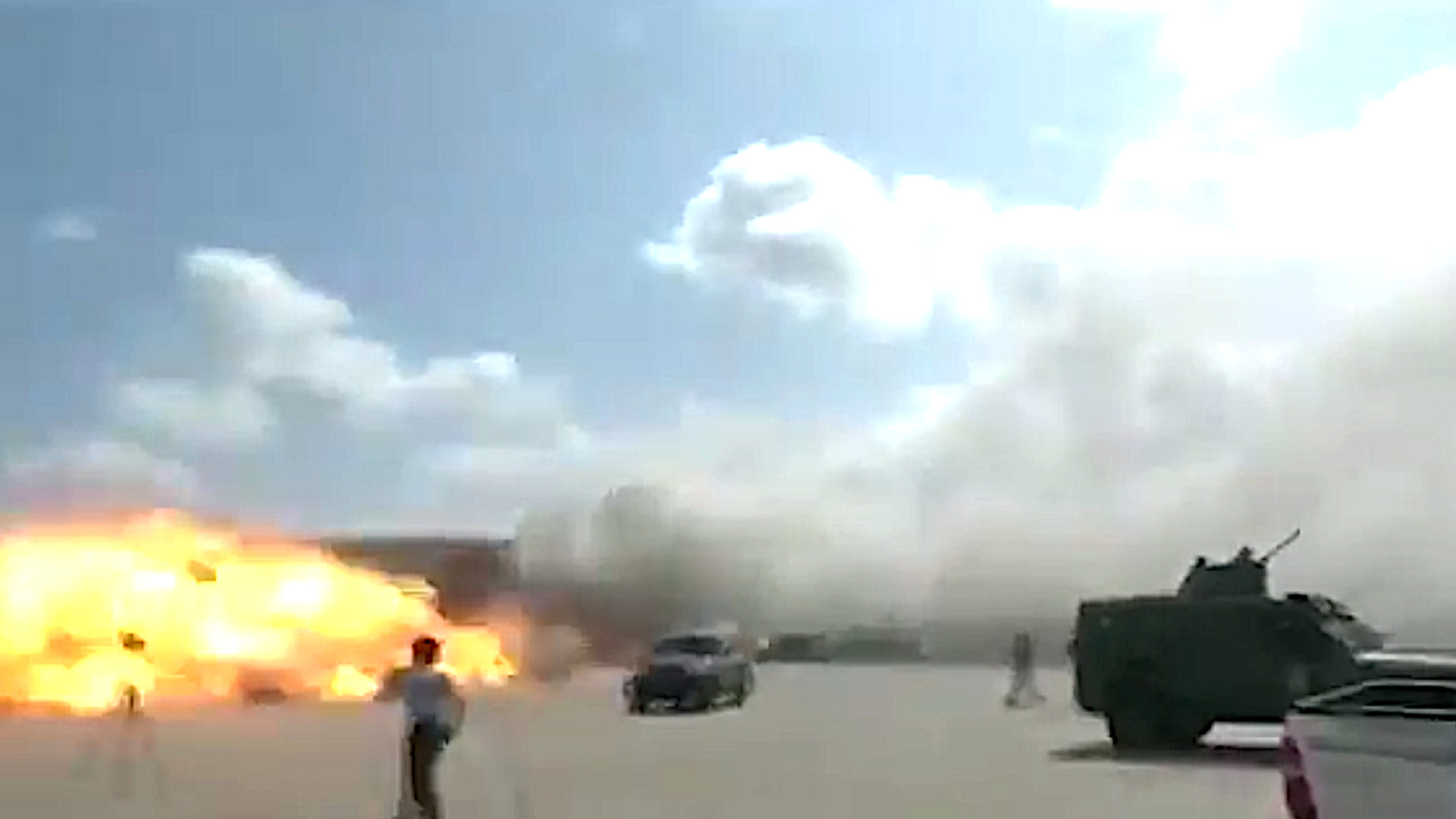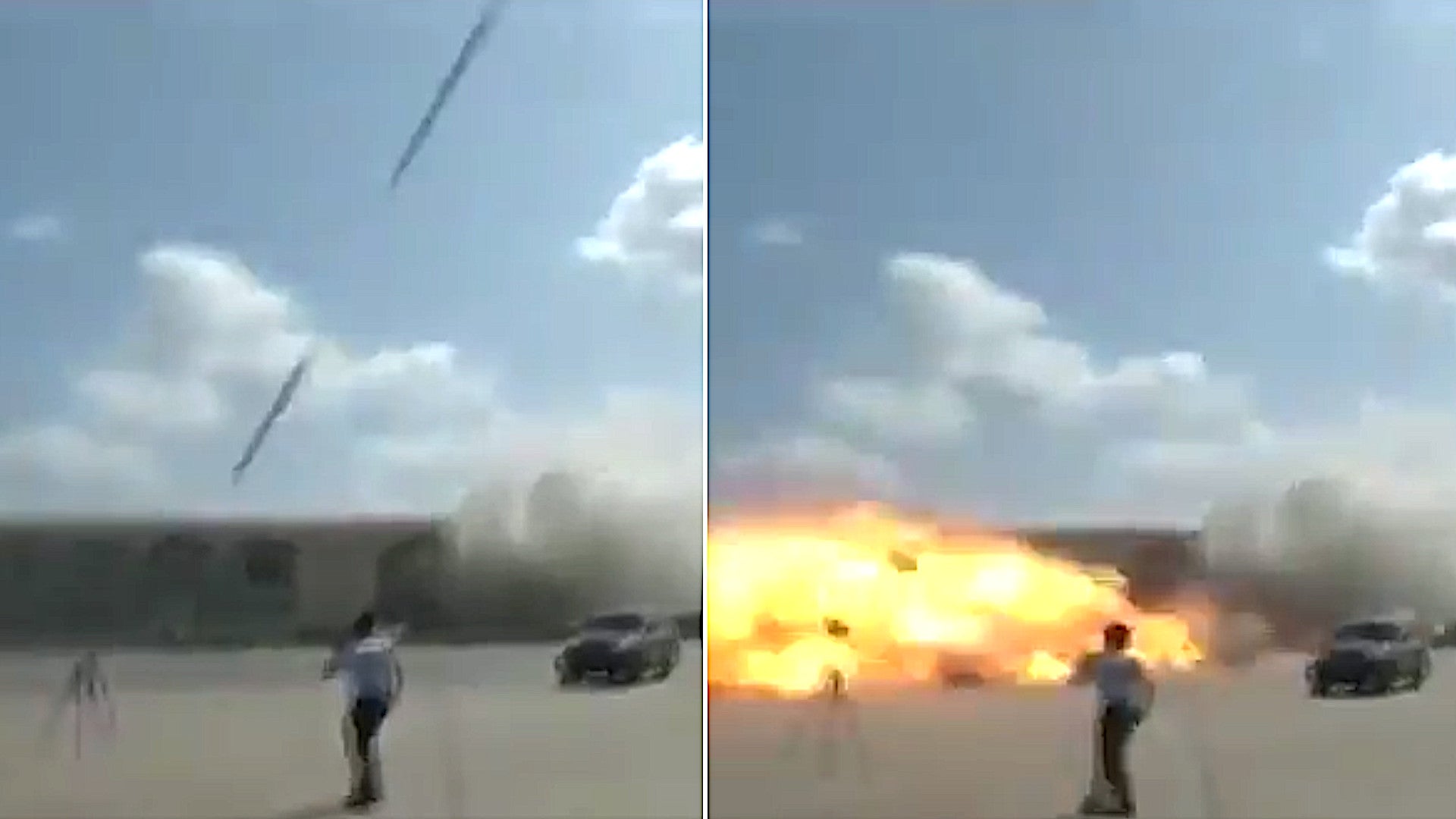At least 26 people have died and more than 50 have been wounded in a high-profile attack on Yemen’s Aden International Airport today. Multiple projectiles struck various parts of the facility just as members of a new Saudi Arabia-backed power-sharing government were disembarking from their plane shortly after touching down in the country.
Yemeni and Saudi officials have accused Iranian-backed Houthi rebels in the country of carrying out the attack. The Houthis, who have been fighting against a Saudi-led coalition for years now and have an expansive arsenal of missiles and suicide drones, as well as other indirect fire weapons, have denied responsibility.

The arrival of the cabinet ministers onboard a Yemenia airlines Airbus A320 flying from Saudi Arabia’s capital Riyadh had been billed a major milestone in healing a schism within Yemen’s internationally-recognized government that had erupted earlier this year. One major faction, the Southern Transitional Council (STC), has been seeking at least greater autonomy, if not full-independence, for portions of southern Yemen and had declared self-rule in the port city of Aden. Earlier in December, Saudi Arabia announced it had brokered the formation of the new power-sharing government agreed on by factions loyal to long-time President Abdrabbuh Mansur Hadi, who has led the country since 2012, and the STC.
As such, various news outlets were filming the arrival of the cabinet officials, who were also accompanied by Prime Minister Maeen Abdulmalik and Saudi Ambassador to Yemen Said Al Jaber, when the attacks occurred. Initial reports have said that mortars, rockets, or drones, or a mixture thereof, may have been employed. Video footage does show the aftermath of what appears to be multiple explosions and at least one projectile, possibly a rocket or missile, hitting the tarmac. Gunfire is also heard, but is unclear if there were any attackers on the ground.
Clips also show the officials, who had been deplaning, rushing back into the aircraft. All of the Yemeni cabinet ministers, as well as Prime Minister Abdulmalik and Ambassador Al Jaber, reportedly escaped unscathed and were eventually moved safely to a presidential palace in Aden, which has served as the de facto seat of the country’s internationally-recognized government after the Houthis took control of the official capital, Sana’a, in 2015.
“We and the members of the government are in the temporary capital of Aden and everyone is fine,” Prime Minister Abdulmalik wrote on Twitter. “The cowardly terrorist act that targeted Aden airport is part of the war being waged against the Yemeni state and our great people, and it will only increase us [sic] insistence on fulfilling our duties until the coup is ended and the state restored and stability, mercy for the martyrs and healing for the wounded.”
Despite their denial, the Houthis certainly have the means and motives to have carried out this attack. The group has also demonstrated the ability to launch relatively precise missile and drone attacks on various targets, including multiple locations inside Saudi Arabia.
There is also unconfirmed video circulating on social media purporting to show what might be some of the projectiles being fired at the airport from the direction of Taiz. That city, which lies to the northwest of Aden, is under Houthi control.
This attack on Aden International Airport does follow a noticeable uptick in missile and drone strikes against targets in Saudi Arabia, as well as other attacks or attempted attacks on ships in the Red Sea involving naval mines and remote-controlled explosive-laden boats, that the Houthis have claimed or that have otherwise been attributed to them. Just last week, Saudi officials said that a commercial cargo ship had hit a naval mine in the southern end of the Red Sea, but provided no additional details.
However, the formal denial of involvement in the attack on the airport in Aden today is notable, as well. The Houthis do not shy away from claiming responsibility for attacks, even ones against civilian infrastructure were innocent bystanders have been hurt or killed. The group also has a robust propaganda apparatus that regularly releases footage of missile and drone launches together with footage of the aftermath of those strikes. With all this in mind, it’s unclear why the Iranian-backed rebels would deny having carried out such a high-profile and already well-publicized attack on the Saudi-backed Yemeni government they are presently fighting if they had actually done so.
As such, there is also a possibility, although much more remote, that members of the STC, or other Yemeni factions within the pro-Saudi camp, who may be unhappy with the terms of the power-sharing deal brokered in Riyadh may have carried out this attack themselves. It is worth pointing out that violent factionalization within the Saudi-led coalition is not new, though it is perhaps under-reported, even beyond the skirmishes between forces loyal to President Hadi and the southern separatists this year. It has also been present at the highest levels of that coalition in the past.
In 2018, a report emerged that the United Arab Emirates (UAE), then a member of the Saudi-led campaign against the Houthis, had hired a mercenary hit squad to assassinate members of the Yemeni political party Al Islah. That group was and remains a pro-Saudi organization with a strong relationship with the government in Riyadh. In 2019, the UAE formally left the coalition fighting the Houthis.
Whoever was responsible for this attack, it remains to be seen exactly how it might further complicate the conflict in the country and United Nations-backed efforts to reach a more robust peace deal between the Saudi-backed government and the Houthis. That the core of the new power-sharing government appears to have escaped the incident unharmed does significantly reduce the chance of a new political crisis erupting immediately.
No matter what, the attack underscores just how fragile the situation in Yemen remains and how even the highest echelons of the country’s government are often at risk on a day-to-day basis.
Contact the author: joe@thedrive.com
